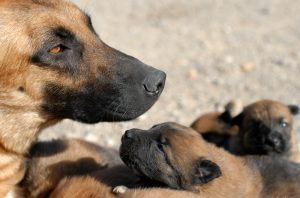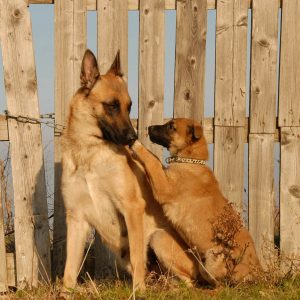Suppose you’re someone who plans on adopting or buying a dog or have had your own share of experiences in this. In that case, this question might have passed your thoughts at least once – do dogs remember their parents, just like how children do? Do puppies miss their mothers?
At the thought that they might, it could be quite the challenge to separate them. Hence, researchers have decided to delve deeper into the psychological capabilities of dogs in terms of recognizing siblings and mothers.
With that said, continue reading to learn more about the answer to “do dogs remember their parents and siblings.”
Can Dogs Recognize Their Parents?
You might be wondering, “do dogs remember their parents?” Regarding this, research has revealed that dogs can recognize close relatives through scent and that they can recognize them even after two years of separation.
However, Dr. Hepper of Queen’s University Belfast in Ireland has proven that this is not a size-fits-all scenario. In fact, there are a lot of dogs who simply cannot remember their parents.
In this case, there are several determining factors that may distinguish a dog’s ability to recognize siblings and parents:
The Critical Period
So, do puppies remember their parents? Well, puppies have a specific time in their life called the Critical Period. In this case, it’s when the puppy is two to sixteen weeks old and is at its most vulnerable stage.
During this time, how they are treated and cared for will significantly influence how they will be as adult dogs and are significant factors that may affect their abilities to recognize others.
At this period, fathers have little to no presence nor roles to fill. On the other hand, their mothers are the ones who feel them and keep them safe and secure. Because of this, dogs are more likely to recognize their mothers than their fathers.
Similarly, this also suggests that if they were abandoned or separated from their mothers at the critical stage, they will probably not remember them anymore as time passes. Instead, they will remember their adopter or the foster dog who cared for them as their biological mother.

Recognizing by Their Faces
What about their siblings? Do dogs remember their siblings? In this case, several studies have suggested that dogs can recognize faces.
This includes the facial features of their owners and other fellow dogs that they are close to. This explains how they can easily spot their owners even in a crowd of strangers.
This was proven in a study made in 2009 when a dog was presented pictures of dogs that they knew and dogs they didn’t know.
According to the results, the dog stared at the pictures of the dogs they were familiar with longer than those they didn’t, thereby supporting the idea that dogs can recognize their parents and even siblings.
Olfactory Senses
Have you ever wondered why dogs sniff a person or other dogs a lot, especially those whom they’ve never met before? The answer to this is that dogs have a stronger sense of smell compared to humans. Hence, it is not surprising that their recognition relies primarily on the person or other dog’s scent.
On their end, taking in the scent of another dog or person allows them to gather important information about them. According to Dr. David Dilmore, this information comes from their scent glands that emit a scent that’s unique to one dog only.
This explains how dogs can recognize dogs that they know even when grouped with dogs of the same breed. So, unlike facial recognition, this works more effectively and allows them to recognize other dogs even after long years of separation.
Age
Dogs share a few similarities with humans, and one of these is that their memory works best when they are younger. Likewise, older dogs, particularly those beyond seven years old, have shorter attention spans than younger dogs, making them struggle to keep their memory on track.
In this case, these older dogs can barely focus on faces and may not be able to recognize their puppies anymore as they grow older.
Do Mother Dogs Remember Their Puppies?
Some dogs may forget their mom. However, mother dogs will never forget their puppies. This is caused by their maternal instinct and behavior wherein they had to care for their puppies during their early stages of development.
In fact, certain activities such as breastfeeding, grooming, nursing, play, and keeping them warm all contribute to forming their bond.
Aside from this, Dr. Hepper’s study revealed that mothers could recognize their puppies’ scent for up to two years of separation, and even if they’ve given birth to another set of puppies during this time.
This proves that mother dogs do, in fact, care for their puppies, hence explaining the many videos circulating on the internet on dogs grieving the loss of their puppies.
Moreover, this maternal duty of female dogs is also why mothers separated from their puppies tend to run away back to where their puppies are, especially if they are still in the area. This happens especially with puppies who are still in their critical stage where mother dogs are needed the most.
Signs Your Dog Remembers Their Parents or Siblings
Family reunions among dogs don’t typically play out how you’d expect, especially if they were separated for a long time. After all, they communicate differently from humans. So, how can you tell if your dog recognizes their parents or siblings?
Relaxed Body Language
One of the primary ways you can potentially tell if your dog remembers their parents or siblings is if they have a more relaxed demeanor when they’re around them. In this case, some of the signs you can look out for are upright ears, a low tail, and a slightly hanging tongue.
Dogs are often more alert and cautious around other dogs, especially if they’re unfamiliar faces. In some cases, they can even be aggressive towards other dogs, particularly if they feel territorial or protective. So, if your dog seems calm around their siblings or parents, it can signify that they remember them.
Playful Behavior
Another sign that your dog potentially remembers their family is if they adopt a playful behavior around them. While dogs are generally highly social animals and often get excited when they see other canines, they’re less likely to immediately start playing if they don’t know or recognize the other dog.
So, if you find your pup being playful around or play bowing to their siblings or parents, this could indicate that they remember them.
Wagging Tail
Dogs wag their tail for numerous reasons, as it serves as one of their primary communication channels. For example, they can wag their tails to express an extensive range of emotions – from joy to excitement, even anxiety, and fear.
They can also use their tails to convey messages to other dogs non-verbally, such as “stay away” or “let’s play.” Likewise, a wagging tail can also indicate that they recognize other dogs, including their families.
However, you should note that this depends on how they position their tails and how fast they wag them. In some cases, a wagging tail can also indicate aggression, so it’s best to be cautious as well since they can still be an active threat.

Frequently Asked Questions
Before wrapping things up, here are some quick answers to the main questions discussed in this article:
Do Dogs Miss Their Parents?
Unfortunately, there’s no way to confirm that dogs miss their parents. However, several instances have shown that dogs can grieve the deaths of their owners, other dog friends, and young.
From this, you can assume that dogs feel sadness and get depressed, which is closely related to longing. This shouldn’t be too concerning as long as the owners shower them with love and care and keep them occupied.
Do Dogs Miss Their Mom and Siblings?
Since it is confirmed that dogs are capable of grieving and feeling sad, it is safe to say that they are also capable of longing. In this case, some dogs may miss their mom and siblings.
However, unlike humans, dogs are easier to calm down as they respond well to affection and all sorts of care.

In Conclusion
Indeed, several studies suggest that dogs can recognize close relatives like parents and siblings. However, certain factors may affect this, including age, presence during the critical stage, face recognition, and scent.
In general, parent dogs will have to be present during the critical period to be recognized by their puppies. At most, dogs will be able to recognize them even after two years of separation. However, this ability may deter when they reach seven years old or beyond.
Unfortunately, there is no way to tell whether dogs miss their parents. However, several videos imply that dogs do get depressed from a loss.
So, how about you? Do you think dogs miss their parents? Feel free to tell us about an experience you’ve had below!

